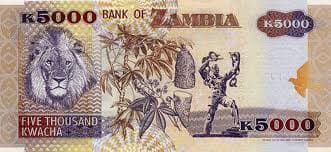THE Kwacha has for the last four weeks been depreciating sharply against other convertible international currencies such as the United States Dollar and various sections of society have expressed fears that the weakening of the Kwacha will push up the cost of production of goods and services. THE Jesuit Centre for Theological Reflection (JCTR) says the gradual but steady weakening of the Kwacha against major international currencies must be addressed from a comprehensive perspective.
JCTR acting information officer Bwalya Musoma said while short-term measures to stabilize the Kwacha were welcome, there was urgent need to focus on long-term solutions.
She added that a broad range of factors must be comprehensively considered in order to address root causes of the Kwacha’s depreciation.
“There is need to continue diversifying the country’s sources of foreign exchange besides traditional exports such as copper,” Musoma said.
She added, “To ensure continued attraction of the economy to investors, government policies must be seen to be consistent and coherent in terms of drafting, implementation and adherence to set policies.”
Musoma explained that Zambia being a largely importing economy, the continued depreciation of the Kwacha would increase the already high cost of living as import costs may be transferred to consumers.
Meanwhile, the JCTR Acting Information Officer revealed that the cost of living for the month of February 2014 as measured by the JCTR’s Basic Needs Basket for an average family of five living in Lusaka had increased to K 3,616.28.
This shows an increase of K11.27 compared to the month of January 2014 when the Basic Needs Basket stood at K3, 605.01.
She attributed the increase in the cost of living to the gradual depreciation of the kwacha as well as an increase in the price of some basic commodities.
“The increase in the Basic Needs Basket is also due to an increase in the cost of vegetables. The cost of dark green vegetables, tomatoes and onions increased from K2.83 to K5.21, K4.99 to K7.54, K4.61 to K6.12, per Kilogramme respectively. These increases are because of decreased seasonal availability of vegetables.” Musoma added.
This was contained in a press statement and made available to the Lusaka Star.
The Kwacha has for the last four weeks been depreciating sharply against other convertible international currencies such as the United States Dollar and various sections of society have expressed fears that the weakening of the Kwacha will push up the cost of production of goods and services.
Weakening of kwacha worries JCTR

